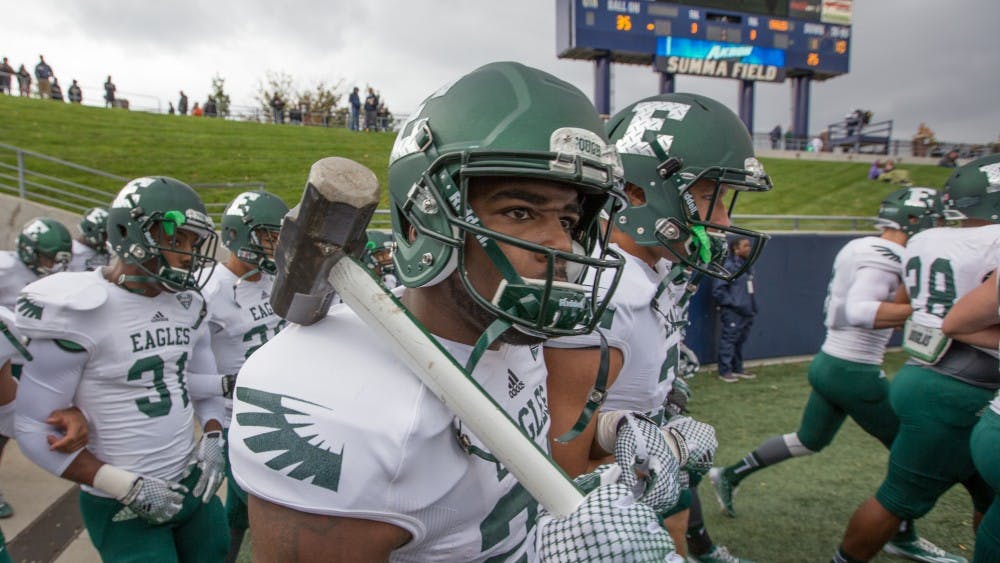Last Friday morning, several top Eastern Michigan University officials held a meeting with Carrie Hessler-Radelet, the deputy director of the Peace Corps, to discuss a new partnership between EMU and the Peace Corps.
The partnership will come in the form of a new master’s degree program at EMU, called a Master’s International.
The Master’s International program would allow students to take one year of coursework at EMU, followed by 27 months of volunteer service abroad in the Peace Corps, followed by one last semester back at EMU.
The idea is to create a mutually beneficial partnership. The Peace Corps will benefit from having highly educated and dedicated students volunteering as part of their education, and students will benefit greatly from the experience and real-world training they receive while working abroad.
“Volunteers are given opportunities that would far surpass what they would normally be able to do in the U.S.,” said Hessler-Radelet, who served in Western Samoa from 1981 to 1983.
“I actually ran a national public awareness campaign because I had started doing some communications work, but really I had very little experience,” Hessler-Radelet said. “But when you’re in a place like Samoa, there’s no one else to do it, and you do it and you learn tremendously from that experience and it really launched my career.”
According to the Peace Corps website, the organization currently has more than 7000 volunteers serving in the fields of education, health, business development, environment, agriculture and youth development, among others.
The first step in the process is when a foreign country reaches out to the Peace Corps and expresses the need for a specific type of service. The Peace Corps then actively recruits qualified people, often from college campuses, who have training or an interest in that specific type of service.
Pravin Mallavaram will be the recruiter for EMU. Mallavaram will be responsible for organizing class talks, information sessions and sending out e-mails to students in an effort to spread information about the Peace Corps and its programs.
“We’re looking for people who have a spirit of volunteerism, that are leaders in their community and on campus,” Mallavaram said. “So the more volunteer experience you have the better off you are.”
So far, recruitment on college campuses has been a big success for students and for the Peace Corps. The Peace Corps is partnered through the Master’s International program with 60 universities.
“Campuses are our number one recruiting place and we love students,” Hessler-Radelet said. “Most of our volunteers are within a few years from graduating from undergrad universities. We also have master’s students who are Peace Corps volunteers, but campuses are the best places for us to recruit so we love coming to schools.”
The meeting between EMU officials and the Peace Corps came just a day after an important anniversary.
On Oct. 14 1960, John F. Kennedy gave a speech at the University of Michigan, challenging students to serve their country abroad in the name of peace. In March 1961, the Peace Corps was created and throughout 2011, the Peace Corps will be celebrating its 50th anniversary.
In 50 years, the Peace Corps has seen almost 200,000 volunteers and has served 139 countries. Regional manager Katie O’Connor of the Chicago Regional Recruitment Office, said what has made the Peace Corps so successful is its grass roots focus that is person to person.
“Our approach is to go in and transfer skills and projects that are determined by that host community and not by us,” O’Connor said. “That’s what makes it sustainable and what will allow Peace Corps to grow.”
Although education and health have been the biggest focus for the Peace Corps in the past, it is adapting to the times. With the evolution of information technology, efforts are being made to become more tech savvy. Literally thousands of new positions are available in varying fields of interest.
“There was a volunteer in Africa that started a program with text messaging to disseminate health information on sensitive topics that people might not be comfortable approaching or talking about in a group setting and sending out that info via text message, and it was a big hit,” O’Connor said.
When asked what EMU students could do to help Peace Corps in its mission, Hessler-Radelet said there are a number of things students can do.
“I would say learn about us,” she said. “Consider international programming. We live in a global economy and Americans who have a better understanding of the rest of the world are going to be in a much better position in the future. We think Peace Corps is an excellent avenue for learning about the rest of the world and we would encourage people to think globally.”









